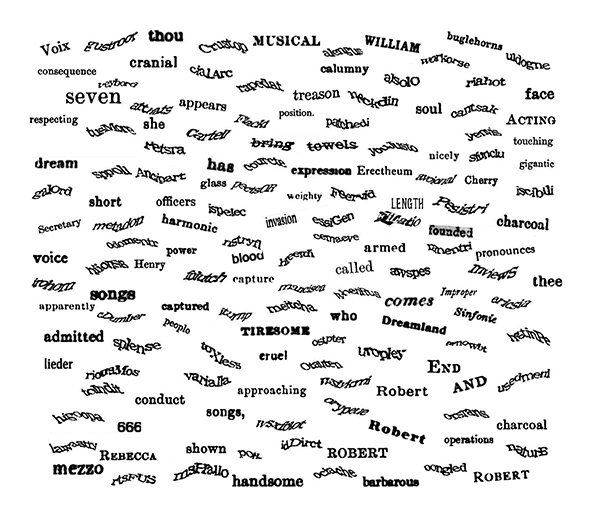Computer Security as a Song Carnegie Mellon’s CAPTCHA Puzzles Provide Unusual Inspiration For New York Composer
Byron SpiceTuesday, December 3, 2013Print this page.

Since they were first developed at Carnegie Mellon University, the distorted word puzzles called CAPTCHAs have been known to make people a little crazy, a little upset and prone to muttering words best left distorted.
Now these sometimes irritating puzzles, designed to protect Web sites from Internet bots, have inspired song.
New York-based composer Robert Paterson has used texts from CAPTCHAs as the lyrics of a classical song cycle for baritone and piano. Entitled CAPTCHA , the five-song cycle is featured on Paterson’s newly released American Modern Recordings album, Winter Songs.
“I think people will probably get a kick out of it,” said Paterson, who, like most people, has seemingly typed thousands of CAPTCHAs. “It relates to something that we’ve all experienced.”
CAPTCHAs (Completely Automated Public Turing Test to Tell Computers and Humans Apart) were originally developed and the term coined in 2000 by a Carnegie Mellon team that included Manuel Blum, professor of computer science, and Luis von Ahn, now an associate professor of computer science. The idea was to protect Web sites from rogue programs by devising a test that could be administered and graded by a computer, but only passed by a human. The idea was quickly embraced and copied worldwide.
In 2007, von Ahn introduced reCAPTCHAs, a two-word version that harnessed the puzzles to digitize old books and periodicals. Google Inc. acquired reCAPTCHA in 2009.
Paterson, on the other hand, was simply looking for a way to fulfill an assignment from the American Opera Project’s Composers & the Voice program. He and other composers were supposed to write a variety of arias and songs that met certain challenges: using no more than four lines of text, using found text, etc.
“We were joking about ideas we could use for found text,” Paterson recalled. “The weirdest thing I could think of was CAPTCHAs.” He settled on reCAPTCHAs, which frequently include both a real world and a fragment or misspelling of a word, and spent hours online searching for suitable reCAPTCHA texts.
When his own name came up several times in a couple of hours, “I thought, ‘This is just awesome. I have to use this.’” When he came upon another text, “apparently cDumber,” he instantly knew he should pair it with “Robert.” He incorporated it into the piece entitled “Secretary Metadon,” which can be downloaded here.
Paterson and vocalist Jesse Blumberg developed pronunciations for the word fragments. Some, such as “splens,” sonically suggested real words such as spleen, while others seemed to evoke a language from the future, he said.
When the song cycle was previewed this summer for a private group at the Rocky Ridge Music Center in Colorado, he said, the audience “just went nuts. It was their favorite piece in the program.”

Byron Spice | 412-268-9068 | bspice@cs.cmu.edu
